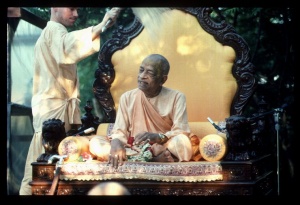CC Madhya 21.145

A.C. Bhaktivedanta Swami Prabhupada
TEXT 145
punaḥ kahe bāhya-jñāne, āna kahite kahiluṅ āne,
kṛṣṇa-kṛpā tomāra upare
mora citta-bhrama kari’, nijaiśvarya-mādhurī,
mora mukhe śunāya tomāre
SYNONYMS
punaḥ—again; kahe—He says; bāhya-jñāne—in external consciousness; āna—something else; kahite—to speak; kahiluṅ—I have spoken; āne—another thing; kṛṣṇa-kṛpā—the mercy of Lord Kṛṣṇa; tomāra—you; upare—upon; mora—My; citta-bhrama—mental concoction; kari’—making; nija-aiśvarya—His personal opulence; mādhurī—sweetness; mora mukhe—through My mouth; śunāya—causes to hear; tomāre—you.
TRANSLATION
Resuming His external consciousness, Śrī Caitanya Mahāprabhu told Sanātana Gosvāmī, “I have not spoken of what I intended. Lord Kṛṣṇa is very merciful to you because by bewildering My mind He has revealed His personal opulence and sweetness. He has caused you to hear all these things from Me for your understanding.
PURPORT
Śrī Caitanya Mahāprabhu admitted that He was speaking like a madman, which He should not have done for the understanding of those who are externally situated. Statements about Kṛṣṇa’s body, His characteristics and His flute would appear like a madman’s statements to a mundane person. It was actually a fact that Kṛṣṇa wanted to reveal Himself to Sanātana Gosvāmī due to His specific mercy upon him. Somehow or other, Kṛṣṇa explained Himself and His flute to Sanātana Gosvāmī through the mouth of Śrī Caitanya Mahāprabhu, who appeared as though mad. Śrī Caitanya Mahāprabhu admitted that He wanted to tell Sanātana Gosvāmī something else, but somehow or other, in transcendental ecstasy, He spoke of a different subject matter.